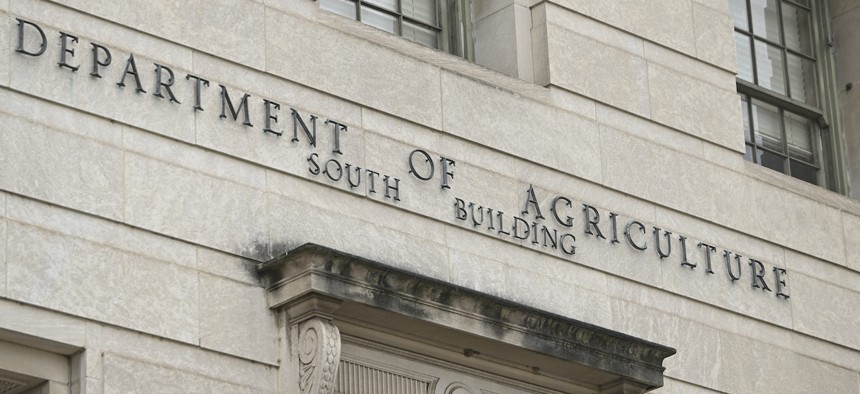
In 2019, officials relocated the Agriculture Department’s Economic Research Service and National Institute of Food and Agriculture to Kansas City, Mo. Celal Gunes/Anadolu Agency via Getty Images
GAO: USDA violated the Anti-Deficiency Act while planning its relocation of science agencies
House Democrats renewed calls to institute tighter regulation of agency relocations in light of the watchdog agency's findings.
A government watchdog agency this week ruled that the Agriculture Department violated the Anti-Deficiency Act and congressional notification requirements when it paid a federal contractor to consult on plans to relocate two research agencies from Washington, D.C., to Kansas City, Mo., during the Trump administration.
In 2019, officials relocated the Agriculture Department’s Economic Research Service and National Institute of Food and Agriculture to Kansas City, Mo., over the objections of employees and some Democratic lawmakers. Following the move, both agencies lost more than half of their staff, leading to a significant loss of productivity that the agencies are only now reemerging from.
And although studies from watchdog groups have already called into question the policy rationale for relocating—the Government Accountability Office last year found that although USDA had a plan to evaluate where to move the agencies, if anywhere, officials ultimately did not follow it—a new GAO decision found one instance where the department acted illegally.
In a decision published Tuesday, GAO General Counsel Edda Emmanuelli Perez examined whether the Agriculture Department met its obligations to notify Congress ahead of transferring nearly $340,000 appropriated for relocation and renovations of the two science agencies’ facilities to the secretary’s office to pay a federal contractor hired to assist in planning for the moves. In short, Perez found that USDA met its obligations as it pertained to the National Institutes of Food and Agriculture, but that it violated the Anti-Deficiency Act by failing to send a renewed notice regarding the funds tied to the Economic Research Service relocation initiative.
At issue is how the funds that were transferred from the science agencies to the secretary’s office were originally appropriated, and whether the department’s August 2018 letter to Congress informing lawmakers of the maneuver still applied when the funds were spent that October, following the end of the 2018 fiscal year.
In NIFA’s case, the money was pulled from a line item specifically dedicated to relocation or renovation of the facility in the fiscal 2018 appropriations package with no time limits on its use, meaning the August 2018 letter met the department’s obligation to inform Congress. But because ERS did not have a similar budget provision authorizing the initiative, GAO found that USDA needed to send a new notification to Congress under the fiscal 2019 continuing resolution, which it failed to do.
“USDA asserts that its August 9, 2018, letter sufficiently notified the appropriations committees,” Perez wrote. “We disagree. On Sept. 28, Congress enacted a continuing resolution for fiscal year 2019. Two days later, on Sept. 30, USDA’s fiscal year 2018 appropriations expired, making them unavailable to incur new obligations. And the next day, fiscal year 2019 began. These events—the enactment of the continuing resolution, expiration of budget authority and change in fiscal years—rendered USDA’s August 9, 2018, letter insufficient for the purpose of notifying the appropriations committees of a transfer of amounts appropriated under the 2019 continuing resolution.”
Although USDA did not respond to a request for comment Friday, GAO wrote that the department argued that since lawmakers have required congressional notification ahead of fund transfers within departments for more than 20 years, there should be no need for a department to issue a renewed notification for the same action across fiscal years.
“USDA asserts that because Congress has enacted [the notification requirement] in some form for 23 years, it relies ‘on the assumption that at a minimum it will be included every year in the form it was in the prior year’ and, therefore, that if it notifies the appropriations committees during the prior fiscal year, then the enactment of a continuing resolution requires no further notification,” GAO wrote. “We disagree. A ‘blanket’ notification that remains valid under subsequent appropriations would not only be inconsistent with eh simple fact that a subsequent appropriation stands apart from a prior one, but would also frustrate Congress’ ability to oversee how agencies spend the funds it appropriates.”
House Democrats on Thursday cited GAO’s ruling as evidence that stronger guard rails need to be in place to govern plans to relocate federal agencies. The Conducting Oversight to Secure Transparency (COST) of Relocations Act, introduced last February, would require agencies to conduct and publish a cost-benefit analysis ahead of any effort to move their offices.
“The Trump administration’s disastrous relocation of two USDA research agencies was an attack on nonpartisan federal workers and the integrity of the essential work they perform for our country,” said Reps. Jennifer Wexton, Gerry Connolly and Don Beyer, all D-Va., in a joint statement. “The new GAO legal review of the relocation emphasizes the need to implement additional common sense guardrails to ensure due diligence is conducted before any agency relocation . . . We cannot allow this kind of politically motivated attack on our civil service to happen again.”







